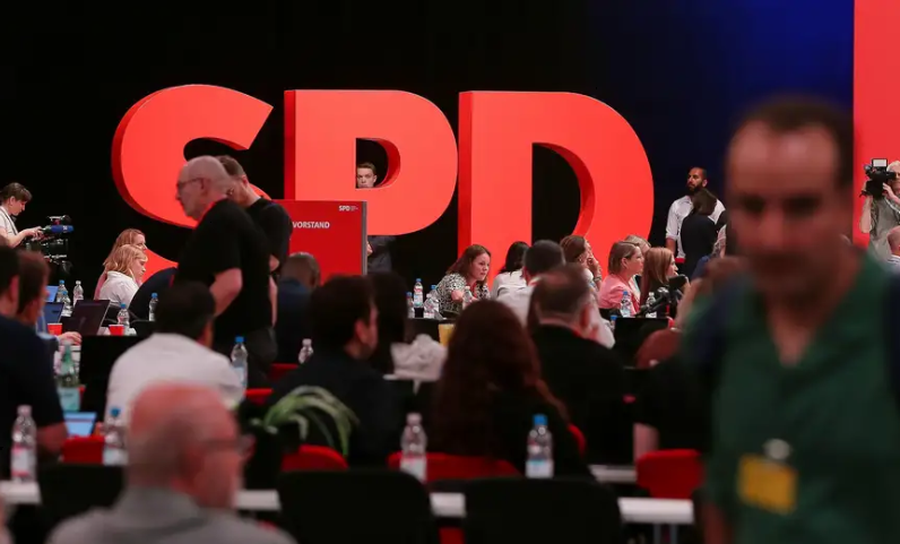
After two months of being in power together in Germany, the Christian Democrats (CDU/CSU) are seeing an increase in citizen support, while the Social Democrats (SPD) are in decline.
Is the SPD still needed? And if so, where and what are its themes? That question was inevitable at the party congress at the end of June. The Social Democrats are deeply shaken after their worst result since 1887 in the federal elections in February.
The results of the latest Deutschlandtrend poll, which is regularly conducted for public broadcaster ARD, will certainly not improve the atmosphere between them.
The SPD, which participates in the government as a junior partner of the conservative CDU/CSU parties, continues to lose support. If elections were held next week, it would win only 13 percent of the vote.
The Infratest dimap Institute conducted the survey from June 30 to July 2, on a sample of 1,312 adults with the right to vote.
The CDU/CSU Union parties have seen a slight increase compared to June and now have 30 percent support (+1). The partly far-right Alternative for Germany (AfD) is supported by 23 percent. The Greens and the Left can count on 12 (+/-0) and 10 percent (+1) of voters.
Other parties, including the Sara Wagenknecht BSW Alliance (4 percent; +/-0) and the FDP (3 percent; -1), still have no chance of crossing the threshold and entering the Bundestag.
Why this trend?
Left-wing SPD members accuse their party leadership of doing too little to ensure peace in Europe. In June, they published a so-called "Manifesto" in which they call for "peace in Europe through defensive capabilities, arms control and understanding." According to the signatories, this includes more diplomacy in relations with Russia. They also oppose the massive rearmament of the Bundeswehr.
Peace politics was once a big part of the SPD, but a recent opinion poll shows that only 11 percent of respondents believe the SPD has the competence to be a party that advocates peace.
When it comes to ensuring peace in Europe, 31 percent of respondents trust the CDU/CSU parties the most, while 14 percent of respondents mention the AfD.
At the same time, 57 percent of respondents agree that they are afraid. But there are big differences between West and East Germans on this issue - most citizens in the East are afraid of the term "war capability."
Supporting military service - even for women
Defense Minister Boris Pistorius (SPD) has long called for the Bundeswehr to "become war-ready again." 62 percent of respondents agree with this and believe that this is a prerequisite for maintaining peace in Europe.
73 percent also believe that Germany urgently needs more soldiers who can defend the country in an emergency. For this reason, they believe that compulsory military service, which was suspended in Germany several years ago, should be reinstated.
More than half of respondents are in favor of reinstating compulsory military or civilian service - for both men and women.
Migration and the economy remain the most important topics
The resolution of armed conflicts, peacekeeping and foreign policy in general - these are considered by 15 percent of respondents as particularly important topics that politics should address. However, migration/refugees (33 percent), the economy (21 percent) and social injustice (16 percent) are mentioned more often.
For the ruling parties, Germany's economic recovery has the highest priority. 20 percent of citizens believe that the situation will improve within a year, 41 percent think that nothing will change, while 35 percent expect the economic situation to worsen further. However, two-thirds of respondents say that this will not affect their personal economic situation.
But 60 percent of respondents believe there is social injustice in Germany, which is the highest percentage in the Deutschlandtrend survey in the last 15 years.
The main reason cited is the huge gap between the rich and the poor. Taxes and fees are perceived as too high and unfair. They believe that the difference between the lowest wages and the so-called Bürgergeld - social assistance for the unemployed - is too small.
Sanctions for those who do not accept the job offer?
Anyone who is temporarily or permanently unable to support themselves and needs help is entitled to social benefits. A single person in Germany receives 563 euros per month, while couples receive 1,012. State spending on these payments has increased significantly since then - to over 50 billion euros per year.
The CDU/CSU union is calling for stricter sanctions for those welfare recipients who repeatedly refuse "acceptable" jobs. Currently, their welfare can be withdrawn for up to two months.
How do citizens view this? Half of respondents believe that the current sanctions are appropriate, 12 percent believe that they are excessive and 35 percent believe that the penalties in such cases should be harsher./ DW (A2 Televizion)











